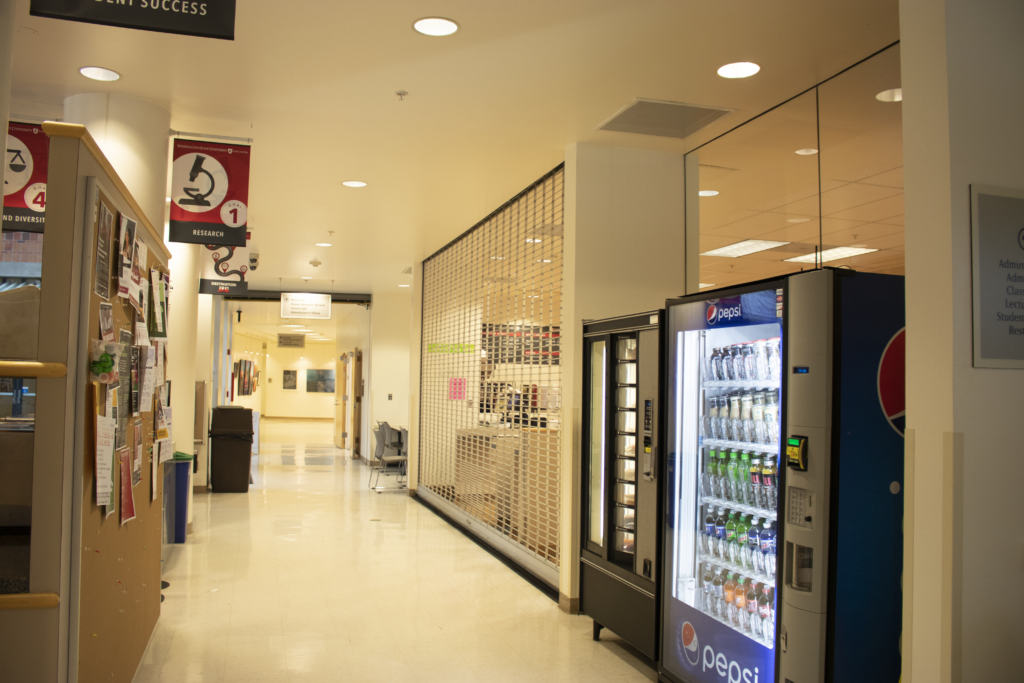The cafeteria is facing shortened hours, menu and price changes due to recent financial pressure as a self-sustaining food service business on campus. Strains from increased costs in food items, coupled with an ever-increasing minimum wage, caused WSU Vancouver’s cafeteria to shorten its weekday operating hours this semester.
Vice Chancellor for Finance and Operations Lynn Valenter elaborated on contributing elements that caused the cafeteria to fall short of funds during the last few years. “Food service is very difficult to break even, of all of the branch campuses for the University of Washington and WSU, we are the only full service, or what I call self-operated [cafeteria],” Valenter said.

WSU Vancouver’s decision to change hours is the main method to establish a stable revenue from the cafeteria. Valenter explained that in order to cover increasing costs, shortening the hours is the most practical option. Sales in the cafeteria decline after 1 p.m. according to Valenter, causing the hours to be adjusted accordingly.
The new cafeteria hours for 2020 are listed as 8:30 a.m. to 3 p.m. on Monday through Thursday, and 8:30 a.m. to 1 p.m. on Fridays.
Micah Black, a junior neuroscience major, works for the cafeteria as a line cook. When asked about how the changing hours affect his personal dining and work on campus, he explained that the earlier closing time fits better with his class schedule, but that it does make access to the cafeteria more challenging.
“It’s kind of inconvenient too because I remember last semester I was able to come in at 5:30 p.m. and stuff was still going on, or even 6:15 p.m. sometimes, so it’s definitely less convenient [for people],” Black said.
Revenue from the cafeteria has fluctuated between gaining or losing $10,000 in the last fifteen years. However, in 2018, the cafeteria lost an estimated $63,000 and in 2019, lost another $71,000 of total revenue. Valenter explained these losses are unsustainable, especially when considering major cost increases.
Chancellor of WSU Vancouver, Mel Netzhammer, elaborated on the cafeteria’s recent decrease in revenue. “In a food service area, it’s never perfect, sometimes they’re going to bring in a bit more money, and sometimes they’ll bring in a little bit less. The institution is there to support that, but ultimately over time they should be breaking even. That was the case for many many years with food services and with the last two years, it simply has not,” Netzhammer said.
Valenter explained that the cafeteria serves a “price-sensitive” community, so the institution tries to be modest with price increases.
Valenter said the most convenient way for students to save money on food from the cafeteria is to swipe a Cougar Card for each purchase, which will deduct the price of tax on an item. By using the MyWSU portal or the cashier’s desk in the Cougar Center, students can transfer funds into their Cougar Card account to use for on-campus services.
Soon, Cougar Cards will have the capability to be used on vending machines throughout campus. Valenter and Netzhammer expect the change in cafeteria hours will increase vending machine use and allow food to be accessed more conveniently for those who purchase snacks often.
Netzhammer said that WSU Vancouver faculty have frequent communication with students regarding what food choices they want so that students can contribute their voice to the conversation.
“We are often in conversations with students, whether that’s the Chancellor Student Advisory Board or Associated Students of Washington State University Vancouver or leadership of ASWSUV, around what they would like to see,” Netzhammer said.
Despite trying to address student suggestions, Netzhammer said students often do not purchase the items requested, resulting in waste.
“We get a list of what students would really like to see, healthier vending machines, or more fresh produce, and in every single year that creates waste. Because what students would like to see theoretically, is not what students buy,” Netzhammer said.
Netzhammer added that perishable food items in vending machines are too often left untouched, and go bad within a day or two of its original sale date.
“We’re in business to meet peoples’ needs, so we’re happy to try things, but we’re only retaining those things that actually have a viable market,” Valenter said.
Nonetheless, some food item suggestions have become successful in the cafeteria the past year. Valenter and Netzhammer explained the newly established ‘grab-and-go sushi,’ hummus dips and protein bowls have become increasingly favored alongside the menu presented through the Culture Cafe.
Netzhammer said that everyday he is on campus, he eats in the cafeteria.
“I do that in part for the community aspect of being down there. I do that to support dining on campus. I do it because I want to have that same experience that everyone else is going through, so that I can understand. I have seen the same price increases that everyone else sees,” Netzhammer said.
WSU Vancouver hopes that these changes on campus will become beneficial to balance goals for both supporting students and maintaining a stable revenue.

Olivia is a senior studying English at WSU Vancouver.
